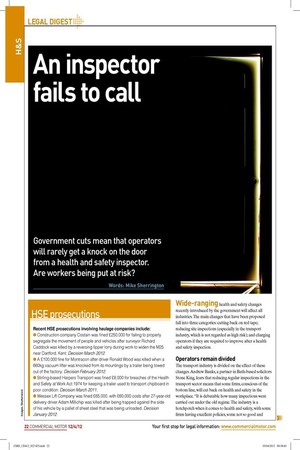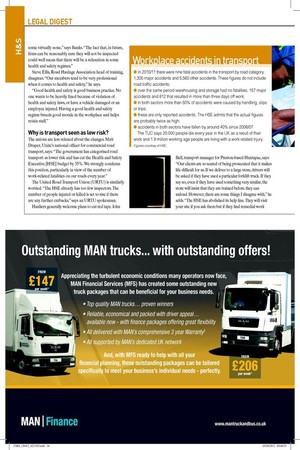An inspector fails to call
Page 16

Page 17

Page 18

If you've noticed an error in this article please click here to report it so we can fix it.
Government cuts mean that operators will rarely get a knock on the door from a health and safety inspector. Are workers being put at risk?
Words: Mike Sherrington
HSE prosecutions
Recent HSE prosecutions involving haulage companies include:
• Construction company Costain was fined £250,000 for failing to properly segregate the movement of people and vehicles after surveyor Richard Caddock was killed by a reversing tipper lorry during work to widen the M25 near Dartford, Kent: Decision March 2012.
• A £100,000 fine for Montracon after driver Ronald Wood was killed when a 660kg vacuum lifter was knocked from its mountings by a trailer being towed out of the factory: Decision February 2012.
• Stirling-based Harpers Transport was fined £8,000 for breaches of the Health and Safety at Work Act 1974 for keeping a trailer used to transport chipboard in poor condition: Decision March 2011.
• Wessex Lift Company was fined £65,000, with £60,000 costs after 27-year-old delivery driver Adam Millichip was killed after being trapped against the side of his vehicle by a pallet of sheet steel that was being unloaded. Decision January 2012. Wide-ranging health and safety changes recently introduced by the government will affect all industries. The main changes that have been proposed fall into three categories: cutting back on red tape; reducing site inspections (especially in the transport industry, which is not regarded as high risk); and charging operators if they are required to improve after a health and safety inspection.
Operators remain divided
The transport industry is divided on the effect of these changes. Andrew Banks, a partner in Bath-based solicitors Stone King, fears that reducing regular inspections in the transport sector means that some irms, conscious of the bottom line, will cut back on health and safety in the workplace. “It is debatable how many inspections were carried out under the old regime. The industry is a hotchpotch when it comes to health and safety, with some irms having excellent policies, some not so good and some virtually none,” says Banks. “The fact that, in future, irms can be reasonably sure they will not be inspected could well mean that there will be a relaxation in some health and safety regimes.” Steve Ellis, Road Haulage Association head of training, disagrees. “Our members tend to be very professional when it comes to health and safety,” he says.
“Good health and safety is good business practice. No one wants to be heavily ined because of violation of health and safety laws, or have a vehicle damaged or an employee injured. Having a good health and safety regime breeds good morale in the workplace and helps retain staff.”
Why is transport seen as low risk?
The unions are less relaxed about the changes. Matt Draper, Unite’s national oficer for commercial road transport, says: “The government has categorised road transport as lower risk and has cut the Health and Safety Executive [HSE] budget by 35%. We strongly condemn this position, particularly in view of the number of work-related fatalities on our roads every year.” The United Road Transport Union (URTU) is similarly worried. “The HSE already has too few inspectors. The number of people injured or killed is set to rise if there are any further cutbacks,” says an URTU spokesman.
Hauliers generally welcome plans to cut red tape. John Bell, transport manager for Preston-based Huntapac, says: “Our clients are so scared of being prosecuted that it makes life dificult for us. If we deliver to a large store, drivers will be asked if they have used a particular forklift truck. If they say no, even if they have used something very similar, the store will insist that they are trained before they can unload. However, there are some things I disagree with,” he adds. “The HSE has abolished its help line. They will visit your site if you ask them but if they ind remedial work needs doing they will charge £142 an hour.” Paul Arthurton, owner of Norfolk-based Paul Arthurton Transport, says: “I believe in core health and safety. No one will say that the introduction of seat belts is a bad thing and many lives have been saved because of it. However, there are so many stupid regulations that I think people are beginning to stop taking responsibility for their own actions. They rely too much on the regulations to protect them. Surely this is a bad thing.” n
WorkpLace accidents in transport
• In 2010/11 there were nine fatal accidents in the transport by road category; 1,305 major accidents and 5,560 other accidents. These figures do not include road traffic accidents; • over the same period warehousing and storage had no fatalities; 157 major accidents and 812 that resulted in more than three days off work; • in both sectors more than 50% of accidents were caused by handling, slips or trips; • these are only reported accidents. The HSE admits that the actual figures are probably twice as high; • accidents in both sectors have fallen by around 40% since 2006/07. The TUC says 20,000 people die every year in the UK as a result of their work and 1.9 million working age people are living with a work related injury.
Figures courtesy of HSE.
Time for a change
Health and safety in the UK is in the process of undergoing significant changes. Key aspects of this are: • the HSE has had its budget cut by 35% and plans to reduce inspections by 33% concentrating on high-risk industries. It does not regard road transport as high risk; • the HSE is to charge for investigations if it is found that remedial work needs to be carried out, but has delayed the implementation of this from April until October; • the government is implementing its ‘Good Health and Safety, Good for Everyone’ strategy based on recommendations from Professor Ragnar Lofstedt, a risk management specialist at King’s College London. The aim is to cut red tape and six minor regulations have been repealed so far; • the government is to launch a health and safety consultants’ register later this year, to raise standards.
Further Information
Useful websites: to find out more about the government’s proposals, go to www.dwp.gov.uk/docs/good-health-and-safety.pdf Details on the Loftstedt report: www.hse.gov.uk/press/2011/ hse-loftsedt.htm Guidance for operators: www.hse.gov.uk.workplacetransport/ index.htm; www.hse.gov.uk/workplacetransport/loadsafety/index. htm











































